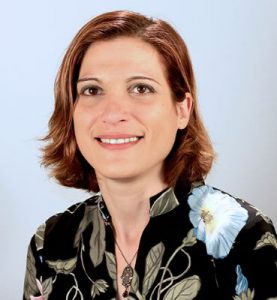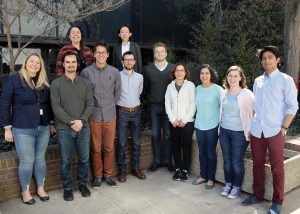
The Data Science for Dynamic Intervention Decision-Making Lab is set to solve real-world health challenges
September 27, 2019
ANN ARBOR – Imagine you had a child with an anxiety disorder and you took them to a psychiatrist who recommends behavior therapy. You meet with the psychiatrist once a week and they work with your child on the way they think and the way they behave. Everything chugs along smoothly for 12 weeks and it seems like your child is making good progress. A good probability is that the psychiatrist will recommend continuing behavior therapy, the treatment plan is pretty cut and dried.
But what if the situation unfolds differently? Imagine that after 12 weeks the behavior therapy is not working. Does the psychiatrist offer medication in addition to therapy? Do they recommend another type of therapy? Maybe. Maybe not. What the psychiatrist suggests next for your child is not so straight-forward.
The very surprising reality is that across almost all of the health sciences, we don’t actually know the best way to help people when it comes to a sequence of treatments. We are still not there yet in terms of “treatment planning” for many disorders, since each case can be so unique.

Daniel Almirall
Some experts will tell you what they think the best treatment plan is, but does the evidence support it clinically? Not necessarily, says Daniel Almirall, a co-director of the Data Science for Dynamic Intervention Decision-Making Lab (d3lab) at the University of Michigan’s Institute for Social Research. “This is particularly true for many chronic or ongoing disorders, such as substance use, smoking cessation, weight loss, diabetes, mental health and autism,” Almirall says. “We don’t have set answers to questions such as: What is the best way to start treatment? What is the best way to monitor someone? What do we do next if something is not working?”

Inbal “Billie” Nahum-Shani
As behavior intervention scientists, Almirall and Inbal (Billie) Nahum-Shani (d3lab’s directors) develop new ways to collect and analyze data to answer those questions. They co-lead a dedicated staff comprised of faculty members, undergraduate and graduate students, and post-docs from various disciplines including statistics, psychology, information science, computer science and medicine. They also serve as the University of Michigan’s “home base” for this type of research on sequential, individualized, treatments.
Nahum-Shani and Almirall founded the d3lab together about two years ago, around the time that both of them were promoted to Associate Professors at the Survey Research Center at U-M.
“Billie and I looked at each other and thought…we have something really special here and we can come together to make a real difference and have an impact,” Almirall says. “We pulled ourselves up by the bootstraps, and brainstormed our name and mission statement.”
Their mission is to use methodology – research strategies that outline the way in which research is to be undertaken and the methods to be used in it – in order to solve real-world health challenges, by trying to understand what type of treatment or intervention works best for whom, and under what conditions. “Our goal is to develop methodology, such as experimental designs and data analytic methods, that can help in improving interventions and treatments for various health and academic problems,” Nahum-Shani says.
She explains that across various domains of health and chronic disorders (e.g., obesity, substance use, autism, depression) it’s clear that the same treatment does not work for everyone, and different people have different needs at different points in time. “Our lab is working on developing methodologies that can help clinicians, teachers and care providers match the treatment to the person and also change the treatment based on the changing needs of that person over time,” Nahum-Shani says.
She adds that this approach is known as adaptive interventions – interventions that use information about the unique and changing needs of an individual to decide when and how to intervene or provide treatments.
Day to day, Nahum-Shani and Almirall have multiple roles. “We could easily sit with a psychiatrist or team of clinician-scientists, for instance, for two to four months discussing how to shape and form the most important questions that need to be answered, and then how best to collect data to answer these questions,” says Almirall. Other roles include conducting the study (e.g., collecting the data), analyzing data from the study, and writing up the results. Depending on the type of study and data collection effort, this process can take anywhere from one to six years for a single project.
In addition, and quite importantly, Nahum-Shani and Almirall often find they have to develop the right methodological or data science tools – for example, new statistical analysis techniques or new ways to collect the data – when no existing tool is currently available to answer specific scientific questions in-hand.
Almirall doesn’t hesitate to say that he loves his job. “It’s fun to wear all these different hats, and it’s rewarding to have an impact on science and know that what we do will help people improve their health,” he says. “It’s why I can wake up in the morning. Because I know that, day in and day out, I’m helping people. I’m using data science tools that can help childrens’ autism or anxiety issues, for example, and that’s exciting.”
Nahum-Shani is equally enthusiastic. She says, “our work has applications in various health and academic problems, including treating obesity, improving school performance of children with Attention-Deficit/Hyperactivity Disorder, helping individuals quit smoking, and treating alcohol and drug dependence.”
She shares that she has always wanted to engage in research that makes a difference in people’s lives. “I wanted to see the tools I developed being used to help people and make population-level impacts. The tools we develop have the potential to do exactly that. They can help create interventions that offer the right type of treatment at the right time, while minimizing patient burden and costs,” Nahum-Shani says. “This increases the probability that people will actually use and engage in treatment.”
As the d3lab grows, they expect to reach more people and continue to make a difference. They already host scientific brainstorming sessions every three or four months to collaborate with behavioral scientists and clinicians from various fields in the process of designing, planning and implementing adaptive interventions and research designs to improve them. Additionally, they provide training and workshops on adaptive interventions and related methodologies.

d3lab team
Despite their hectic schedules, they never neglect their own backyard as they recognize their staff plays a huge part in the lab’s reach and success. During the school year, they hold weekly lab meetings that function in part as brainstorming sessions. Almirall explains, “we usually have one of our students or post docs – or even myself sometimes – sign up to share where we are stuck in our research and then everyone offers ideas on how to get unstuck.”
This approach was taught to them by their mentor, Susan A. Murphy, now retired from the university. They love it because it’s rewarding to their whole team, and Almirall and Nahum-Shani are determined to build a collaborative environment where everyone is on the same page and has mutual respect for each other.
Respect and admiration are words that Almirall and Nahum-Shani use when talking about each other and other members of the lab. “Danny is a true leader and an amazing communicator. Our lab is highly multidisciplinary, which is necessary for the type of research we do, but it can be challenging because lab members have different perspectives and scientific jargon,” Nahum-Shani says. “Danny has the genuine curiosity and unique ability to translate concepts and ideas from one discipline to another and facilitate highly productive discussions.”
Although they are co-founders, Almirall counts Nahum-Shani as one of his role models. Speaking to the impact Nahum-Shani has had on him on a personal level, Almirall says that he had an understanding about the notion of universal reciprocity, but Nahum-Shani really helped drive the concept home.
Almirall recalls that when he and Nahum-Shani first talked about universal reciprocity something really clicked inside of him. “To me, it means that in any of your day-to-day interactions you are loving and caring for the person standing in front of you, whether it’s a co-worker or a scientist you’ve just met,” he says. He further explains: “You try to do the best that you can, right then and there, and not expect anything in return. And the universe will take care of you.”
That particular conversation happened about three years ago, but it is something Almirall is always conscious of. “I see Billie practicing it and I try, too. But also, we do the best we can to teach universal reciprocity to our coworkers and students,” he says. “So that they’re reminded that it’s not just about them, and they realize that their work at the lab is actually about impacting the lives of others. And that is what’s most important to us at the end of the day.”
Written by Jaishree Drepaul-Bruder
More:
Contact:
ISR Communications team, [email protected]
